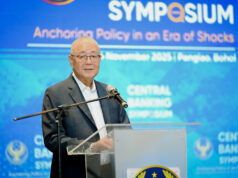Budget gap widens to record P660B
THE BUDGET DEFICIT widened to a record P660.2 billion in 2019, as the government spent nearly P500 billion, mainly for infrastructure projects and social protection programs, in December alone.
Data from the Bureau of the Treasury (BTr) released on Thursday showed expenditures of P3.797 trillion jumped by 11.42% for the full year, outpacing the 10% rise in revenues to P3.137 billion.
The full-year budget gap breached the P620-billion deficit programmed for the year, and is 18.27% higher than the P558.3- billion deficit in 2018. This translated to 3.55% of gross domestic product (GDP), exceeding the 3.25% limit for the year.
The Development Budget Coordination Committee (DBCC) set a budget deficit ceiling of P610 billion or 3.2% of GDP for 2019.
“Expenditures sped up despite the delay in the approval of the 2019 budget as line agencies caught up with spending towards the latter part of the year,” the BTr said in a statement.
For December, expenditures surged 57.83% to P494.4 billion — the highest-ever monthly spending recorded, while revenues grew by 4.77% to P243.3 billion.
“In particular, disbursements for the month of December surged by P181.1 billion… backed by strong infrastructure spending of the DPWH (Department of Public Works and Highways), implementation of social protection programs and services of the DSWD (Department of Social Welfare and Development), and personnel services expenditures with the grant of the Service Recognition Incentive, payment of pension and retirement benefits, as well as requirements for the creation and filling of positions in various agencies,” the BTr said.
The budget shortfall for December widened to P251.1 billion from an P81 billion deficit in the same month in 2018.
“The higher spending recorded in December could help offset the potential effects of the virus fallout,” Jonathan Ravelas, chief market strategist at BDO Unibank Inc., was quoted by Bloomberg as saying. “If they are able to continue this pace of spending, it could help the economy more.”
Like many Asian countries, the Philippines is looking to cushion the economic impact of the coronavirus disease 2019 (COVID-19) which continues to spread around the world.
Nicholas Antonio T. Mapa, senior economist at ING Bank NV-Manila Branch, said he expects the strong government spending in the first half to “insulate” the economy this year as COVID-19 will likely curb household spending.
He also said the strong spending data could prompt an upward revision of the 2019 GDP growth to six percent from its current 5.9%.
“The surprise surge in spending in December is reflected in the aggressive borrowing stance of the BTr of late and we can expect this behavior to continue given the concurrent 2019 and 2020 budgets running parallel this year,” Mr. Mapa said in a note sent to journalists.
SPENDING SURGE
Actual government expenditures last year exceeded the BTr’s P3.769-trillion spending plan by 0.74%.
Broken down, primary expenditures — total spending net of interest payments — reached P3.436 trillion last year, exceeding the P3.370-trillion program and 12.34% up from the P3.059 trillion spent the previous year.
Interest payments also rose 3.34% year-on-year to P360.9 billion, but was 9.68% below the P399.6-billion target.
The BTr said interest payments as a percentage of revenue and expenditures declined to 11.50% and 9.50%, respectively (from 12.25% and 10.25% in 2018), “highlighting affordability and sustainability in the country’s debt and borrowing operations.”
Meanwhile, national government revenues increased by 10% to P3.137 trillion in 2019, falling 0.39% short of the P3.149-trillion program for the year.
Broken down, tax collections accounted for the 90.1% or P2.827 trillion of the year’s total revenues. While tax collections increased 10.21% year on year, the figure was still 4.3% short of the P2.955-trillion target last year.
“Revenue effort went up to 16.86% from 16.36% in 2018 and exceeded the program of 16.51% [while] tax effort [stood at] 15.19% lower than the goal of 15.49% but higher than the previous year’s 14.72%,” the BTr report read.
The Bureau of Internal Revenue (BIR) collected P2.175 trillion last year, up 11.46%, while the Bureau of Customs collected P630.3 billion, a 6.27% increase from year-ago figures.
However, the country’s two largest tax-collecting agencies fell short of their targets, with BIR’s tax collections 4.22% lower than its P2.27 trillion goal and BoC’s collections 4.65% less than the P661.0-billion goal.
The BTr said the BIR missed its target due to lower revenues from the excise tax on fuel and sweetened drinks, while Customs’ shortfall was mainly due to the stronger peso and lower volume of importations.
Meanwhile, taxes collected by other offices inched up 5.33% to P22 billion but were 4.27% short of the P23-billion collection target.
Revenues from non-tax sources rose 8.9% to P309.7 billion, exceeding the P194.2-billion target by 59.41%.
“Although total revenue was growing 10.08% y-o-y, government must be prudent and careful about budget deficits and being able to do what was set to be done,” UnionBank of the Philippines, Inc. Chief Economist Ruben Carlo O. Asuncion said in a Viber message.
For Mr. Asuncion, the fiscal deficit will likely exceed its ceiling again this year at 3.2% of GDP as the government is expected to provide fiscal stimulus to support economic growth this year, targeted to land within the 6.5-7.5% band. — Beatrice M. Laforga with Bloomberg




